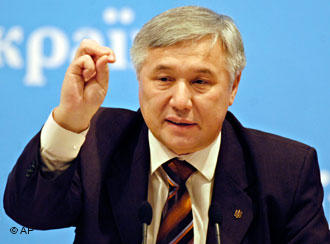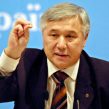
UKRAINE: BACK TO STRATEGIC SQUARE ONE
Publication: Eurasia Daily Monitor Volume: 3 Issue: 167
By:

Cohabitation of the Party of Regions with a minority Orange faction and a Regions-dominated government would seem to mark a shift in Ukraine’s foreign policy paradigm: from the Euro-Atlantic orientation proclaimed by the short-lived Orange Revolution, back to the Kuchma era (1994-2004) “two vectors” paradigm of balancing between Russia and the West. This setback directly affects key aspects of Ukraine-West relations, such as the prospects of NATO membership for Ukraine.
On the other hand, the paradigm change raises the question of whether efforts to meet NATO membership criteria might not after all turn out to be more effective as one component in a two-vector policy, rather than adopting a single pro-Western vector under an inept presidency.
President Viktor Yushchenko’s reported wish to appoint the loyalist ex-prime minister Yuriy Yekhanurov as Secretary of the National Security and Defense Council would (if carried out) continue the tendency toward lowering the NSDC’s effectiveness and professionalism. Yushchenko set the NSDC on that downward path by appointing personal and business allies such as Petro Poroshenko and Anatoly Kinakh — who, like Yekhanurov, have no background in international or national security affairs — as NSDC secretaries in quick succession during 2005 and 2006. The current NSDC Acting Secretary, Volodymyr Horbulin, could have been one of the most inspired appointments of the Yushchenko presidency, but he cannot continue serving because he has exceeded the mandatory retirement age. Horbulin, a close ally of former president Leonid Kuchma, served with distinction in that post during the Kuchma era, when Ukraine’s cooperation with NATO advanced far more effectively than was the case during the short-lived Orange era.
At policy conferences and strategy sessions, those disappointed with the unfulfilled Orange promise seek to relativize the return to a two-vector paradigm by developing what may be termed ex post facto consolation points. Such consolation points center on the following assertions:
— The returning prime minister Viktor Yanukovych and his Party of Regions are “not pro-Russian”; “Ukraine is not Russia”; and “Ukraine is not going the way of Belarus.” Such arguments, while undoubtedly correct as far as they go, would seem to set a rather low threshold for satisfaction with the political outcome of the Orange era. “Ukraine is not Russia” is a Kuchma motto and title of the book he published in 2004.
— “Even Kuchma resisted Russian proposals to hand over the gas transit system to Gazprom’s control,” hence the Regions-dominated government would not do so either. While the factual assertion is correct, the corollary may not be so. In fact, Yushchenko’s energy team and the Yekhanurov government initially set the stage for such a transfer through the RosUkrEnergo deal, and an actual transfer of local gas distribution systems to Russian interests began as the new government took office in August. The new government says that it would not hand over control of the strategic transit pipelines, however.
— “Having the Party of Regions in government is a preferable situation to having that party agitate in the opposition against Ukraine’s NATO candidacy.” The Verkhovna Rada did, after all, vote in August to admit foreign troops for exercises on Ukrainian territory. While the first argument is probably valid tactically, its strategic validity seems far from certain. The Party of Regions is for “cooperation” with NATO but against membership, the latter being in any case a distant possibility. The Rada did admit British, Slovak, and Moldovan troops, as well as a Russian-commanded naval squadron from five Black Sea riparian countries, for exercises in August-September. However, the presidency mismanaged and the Party of Regions sabotaged the legislative process that would have been required for approval of far larger military exercises with American and other forces from NATO countries in Ukraine in May through August 2006. The Verkhovna Rada had voted the necessary authorizations for such exercises on an annual basis since 1997 and can again be expected to do so from now onward.
— With public support for NATO membership currently in the range of only 15-20%, Ukraine can hopefully regain the 30-35% level that was recorded in the late 1990s, the argument goes. Thus, Ukraine-NATO relations in the Kuchma era are again implicitly regarded as a benchmark. Furthermore — this argument continues — some Central European countries in NATO show less than 50% public support for membership at this time or include parties that are less than pro-Western in coalition governments (Slovakia, Poland), so that Ukraine is not a singular case, the argument concludes. It seems to overlook the difference between those countries being inside NATO and Ukraine being outside of the alliance, as well as the fact that those less-than-pro-Western parties are minor components of coalition governments with pro-Western majorities.
— Ukraine will not engage in any significant military exercises with Russia and keep its distance from the CIS Collective Security Treaty Organization, according to a further consolation point. While probably on target, this forecast again means a return to the situation that existed in the 1990s in this respect.
It is now clear that NATO’s November 2006 Riga summit will not approve a Membership Action Plan (MAP) for Ukraine. However, the missed date is no serious cause for disappointment. Such disappointment would seem, rather, to reflect a Washington tendency to tie policy to summit events. In fact, Ukraine can receive its MAP next year, conditional on adequate — and adequately financed — security sector reforms under the ongoing NATO-Ukraine programs.
For now, Ukraine seems to have reverted to the strategic square one of the pre-2004 era, with its two-vector policy between Russia and the West and cooperation with NATO, short of early membership, although with a realistic prospect of eventual membership contingent on performance.




